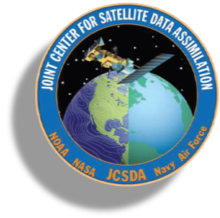At the Unifying Innovations in Forecasting Capabilities Workshop (UIFCW) on July 24-28, 2023, JCSDA was in the spotlight from day 1 when Dr. Michael Morgan, Assistant Secretary of Commerce for Environmental Observations and Prediction at NOAA, described JEDI as NOAA’s long-term data assimilation strategy in his opening remarks. Next up was Dr. Dorothy Koch discussing how the spack-stack build collaboration between EMC, JCSDA, and EPIC will become the software stack used for UFS and JEDI, followed by an overview of the state of UFS science and the priority put on advancing coupled ensembles using the JEDI coupled DA system. The day wrapped up for JCSDA with a presentation by Dr. Sarah Lu, JCSDA/SUNY Albany, on using UFS as a teaching tool in the academic setting.
Day 2 included several presentations by JCSDA staff and partners, spread across several topics and sessions. In the morning session on Medium-Range Weather Application and Subseasonal to Seasonal Application Dr. Zhaoxia Pu, professor of atmospheric sciences at the University of Utah and a member of NOAA’s Science Advisory Board, discussed developing a strongly-coupled land-atmosphere DA system for UFS using JEDI. Two of the three concurrent afternoon sessions had JCSDA speakers: Sarah Lu on integrating JEDI and METplus for evaluating atmospheric composition forecasts in the session on physics, verification, and validation, and director Tom Auligné on JCSDA Next-Generation Earth System Data Assimilation for the UFS in the session on system architecture. Tom’s presentation focused on JEDI’s timeline for operational transition as well as future goals such as coupled multiscale earth system data assimilation and robust and engaged community involvement. He also highlighted Skylab’s usefulness as a turnkey solution for real-world experimental testbed needs, giving communities a mechanism for doing scientifically relevant experiments without the resources a large full-resolution model requires.
The highlight of day 3 was a panel on JCSDA, EPIC, and Community DA Development. Tom Auligné was one of the six panelists, discussing how all the major US agencies doing DA are adopting the JEDI framework and hopes for expanding new capabilities and therefore enabling new levels of scientific exploration in the future. Dr. Neil Jacobs, Chief Science Advisor for UFS, confirmed that he is “all for” waiting for JEDI to train new staff on DA rather than training for GSI, which will be sunset in favor of JEDI once it’s operational. Finally Daryl Kleist, Supervisory Physical Scientist for NOAA/NWS/NCEP/EMC, declared that “JEDI is the centerpiece of everything we want to do over the next decade.”
On Thursday, day 4, JCSDA was well represented with a presentation by SOCA team lead Dr. Travis Sluka on JEDI-Based Data Assimilation for the UFS Marine Components, as well as one on Extending the JEDI-Based Global Aerosol Assimilation System to Improve Aerosol Prediction in the Unified Forecast System by meteorologist Bo Huang. A discussion of spack-stack later in the day highlighted JCSDA contributions as well.
The conference wrapped up on Friday with closing remarks which underscored the importance of DA and the need for a focus within the UFS community on developing JEDI.
You can find the UIFCW 2023 Schedule and Information Page here and recordings of all of the sessions here.
Photo by David Gylland on Unsplash

